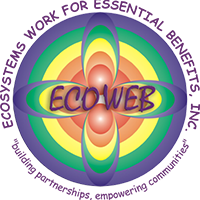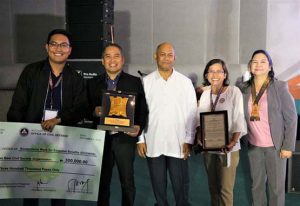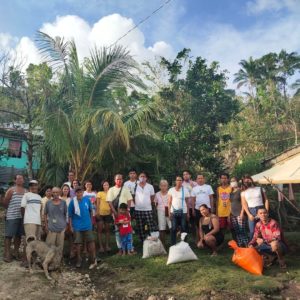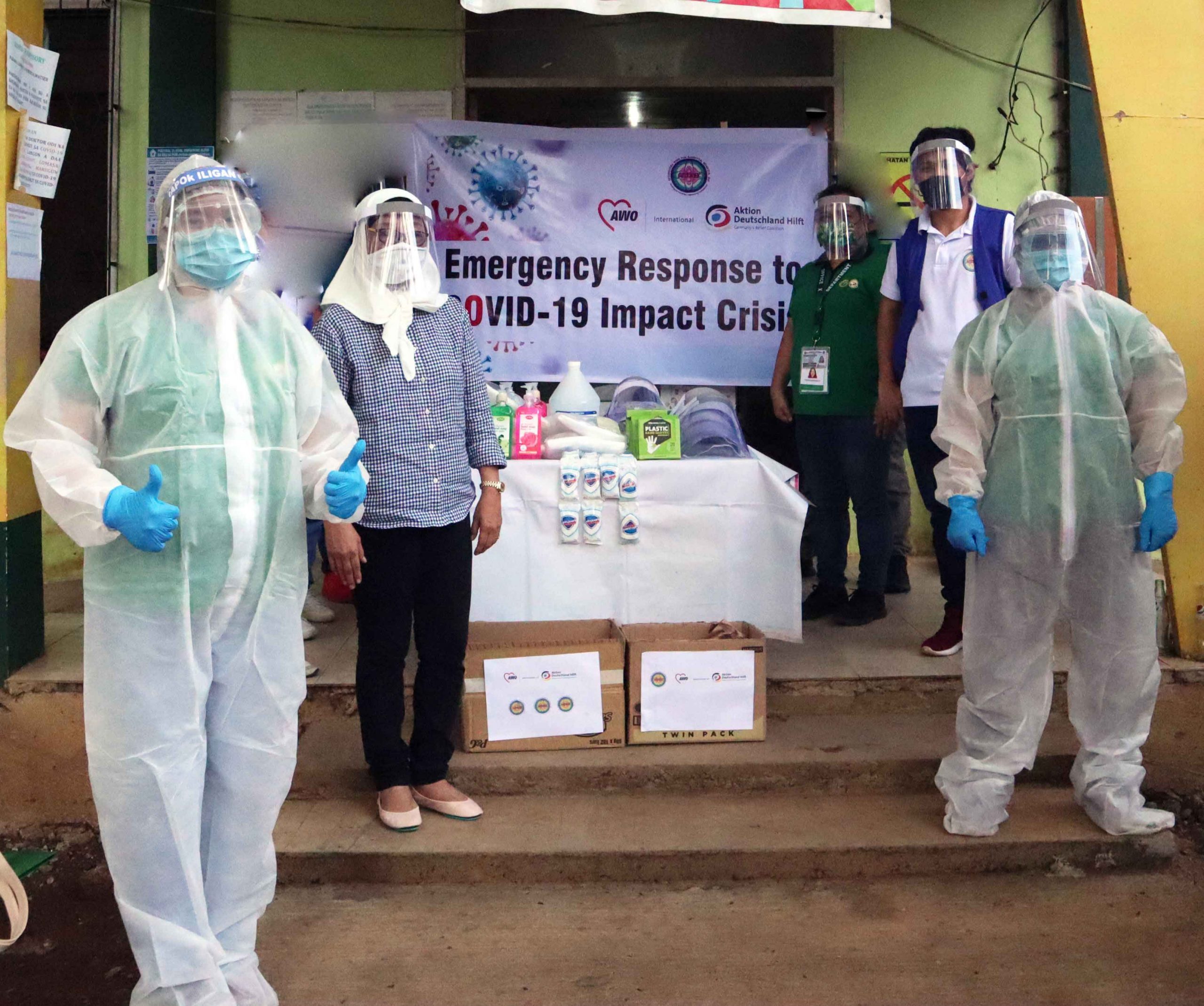
The two-year partnership between the Ecosystems Work for Essentials Benefits, Inc. (ECOWEB) and AWO International manifests great accomplishments. The endeavor of providing humanitarian service defeats both natural and man-made calamities that even to the tiniest challenger – COVID-19, service to humanity never falter.
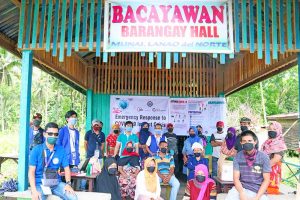 ECOWEB with the funding support from AWO International has been helping the recovery of the 4 barangays; Calimudan and Mindalano in the Municipality of Salvador and Bacayawan and Lininding in the Municipality of Munai in the province of Lanao del Norte. All barangays were heavily impacted by Typhoon Vinta in December 2017. The assistance for Calimudan and Mindalano started in 2018 and that of Bacayawan and Lininding started in September 2019.
ECOWEB with the funding support from AWO International has been helping the recovery of the 4 barangays; Calimudan and Mindalano in the Municipality of Salvador and Bacayawan and Lininding in the Municipality of Munai in the province of Lanao del Norte. All barangays were heavily impacted by Typhoon Vinta in December 2017. The assistance for Calimudan and Mindalano started in 2018 and that of Bacayawan and Lininding started in September 2019.
The new project entitled “Enhancing Local Capacity on Community-based Disaster Risk Reduction and Management for Typhoon Vinta-affected Barangays in Munai and Salvador, Lanao del Norte,” aims to sustain the recovery of the four barangays especially in enhancing their capacities to address their vulnerabilities. The new project is just few months from its implementation when another major risk confronted them – the COVID-19 pandemic that halted the project implementation.
A project entitled, “Emergency Response to the Impact of COVID-19 Crisis to the 4 barangays in Salvador and Munai, Lanao del Norte” was launched. Objectives include promotion of sanitation and hygiene by providing kits to vulnerable families in the community and provision of tippy tap hand washing materials, improving access of local health units and schools to sanitation and hygiene facilities, and support to families from impact of COVID-19 outbreak.
The first component of the project was to promote sanitation and hygiene. A total of 787 families have benefitted from 2,126 bath soap (bar), 2140 laundry bar soap and 220 powder soap which could maintain cleanliness and prevent from getting virus from the environment. Totality’s breakdown came from 180 beneficiaries consisted of 103 female and 77 male in Bacayawan, Munai, and 180 beneficiaries consisted of 79 female and 101 male in Lininding, Munai.
20 tippy tap materials were provided to the barangays through the BDRRMCs in Munai and self-help groups in Salvador and each barangay was given with 5 pieces of liquid soap. Residents of Barangay Calimudan were provided with jerry cans as they have difficulty on water supply.
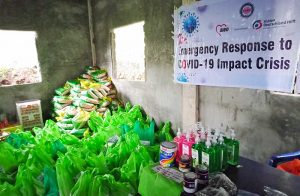 The distribution was facilitated by the project team, assisted by the self-help groups (SHG) and barangay leaders with the help from the Philippine National Police. Each family received one jerry can and three pieces of bath soap.
The distribution was facilitated by the project team, assisted by the self-help groups (SHG) and barangay leaders with the help from the Philippine National Police. Each family received one jerry can and three pieces of bath soap.
Upholding the legacy of the survivor and community-led response (sclr) as an approach towards community reliance and entitlement, the BDRRMCs and SHGs were given the privilege to make the tippy-tap and to choose the area where it will be placed. The project team just made sure that the area should be categorized as having the following; area with insufficient water supply, school of children to encourage frequent washing of hands and provide availability of supply, and areas accessible to everyone.
A part of the educational campaign, four tarpaulins were posted in each barangay and brochures were provided during the orientation containing the COVID-19 information and prevention.
The turnover of personal protective equipment (PPE) and hygiene kit was coursed through the municipality’s Rural Health Units (RHU) who coordinates the health activities of every barangay. They are the ones to employ personnel assigned in every barangay to include Bacayawan and Lininding of Munai and Calimudan and Mindalano of Salvador, hence, PPEs were turned-over to the RHU.
The distribution in Munai was delighted by the presence of Doctor Sofia Omar, MD together with the nurses from RHU. While in the municipality of Salvador, the turnover of kits was received by Dr. Al Harvery Galorio, head staff.
‘’We are very grateful to ECOWEB because they are our partners during this time in fighting this pandemic. We knew that your job is not easy in serving and reaching the communities during this time considering that the resources are very limited especially the transportation but, you still exerted an effort to be here. We are overwhelmed by your presence and the assistance that you have provided especially the PPE since we are badly in need of those.” said Galorio.
PPE set includes 30 pieces of face shields, 10 packs of disposable gloves, 8 sets of protective suits, ½ galloon of alcohol, 4 pieces of liquid hand soap (500 ml) and 10 pieces of hand soap (60 grams) in Salvador while 40 pieces in Munai. 100 washable face masks were distributed to the members of BDRRMCs which consist of 25 recipients per barangay.
In Munai, there were 14 PPE beneficiaries composed of 3 male and 11 female. Meanwhile, a total of 9 beneficiaries consist of 4 male and 5 female, were also from Salvador. These recipients are the frontlines of the community who are mostly RHU staff and volunteers.
The activity was then followed with a Community-based Awareness Campaign on COVID-19. The discussion in Munai was led by nurse Marvin Gorres and was participated by each BDRRMC unit. Bacayawan had 22 participants composed of 10 male and 12 female. On the other note, Lininding had 20 participants composed of 12 male and 7 female.
The project also released relief goods to vulnerable families impacted by the virus outbreak. The identification of the beneficiaries was done through the coordination of the project team with the BLGU and SHG. A collaborative assessment was done to community residents to identify their capacity and vulnerability before being qualified for the assistance.
The same 787 families received relief assistance including food and hygiene kit. It was benefitted by 180 beneficiaries in Bacayawan and 180 in Lininding who received 5 kilos of rice, 1 kilo of brown sugar, 1 kilo of salt, 1 pack of oil, 2 pieces of fruits and 3 pieces of different kinds of vegetables. The distribution in Munia was made possible with the help of the BDRRMC officers.
Meanwhile in Salvador, goods were distributed to 427 families which comprised of 222 in Calimudan and 205 families in Mindalano. The distribution was delegated per SHGs, 11 in Calimudan and 10 in Mindalano. It was then that SHGs took the responsibility on the distribution per group. Package contains the same as that of Munai.
“I found it hard to feed my family considering that my business stopped for the mean time and I do not have any other source of income more than it. Both I and my husband are in the same business, selling cloths such as abaya, malong, bedsheets and others. ECOWEB brings so much bliss to me and to Brgy. Mindalano itself for not only providing us relief goods but most importantly, ECOWEB is God’s mean in raising awareness on COVID-19. Everyone has no assurance if when the virus ends and I am still happy that ECOWEB continues to help people despite the pandemic.” said by Hadji Sarip, 49, businesswoman from barangay Mindalano, Salvador.
The program implementation hailed successful through the help of the different stakeholders-BDRRMC, SHG, MSWD, RHU, Municipal Agricultural Office (MAO), MDDRO, MLGU. Collaborative efforts strengthened the pillars of humanitarian service and community development.
The coordination with the barangay local government unit (BLGU) entrenched a continuous support to ECOWEB with all of its projects and interventions to the community. Barangays Bacayawan, and Lininding in Munai, and Calimudan and Mindalano, Salvador offered their all-out support from gathering and preparing the community, to keeping the ECOWEB team safe on the entire duration of the activity.
In the midst of this pandemic where everyone is affected, there is no excuse not to continue stretching and extending service to humanity. Collaborative effort combined with passion and dedication result into a pervasive impact to the lives of Filipinos.
Article Contributor: Khalid Bantog

